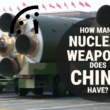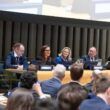Fundamental changes to address fundamental problems
By Ehud Eiran, June 21, 2013
Nearly 40 years ago, the UN General Assembly first adopted a resolution endorsing the establishment of a nuclear-weapon-free zone in the Middle East. At the 2010 Review Conference for the Nuclear Non-Proliferation Treaty (NPT), specific measures to advance this vision were agreed upon. In the years after the 2010 conference, more than at any other time over the course of four decades, international players took concrete steps toward implementing the vision of a WMD-free zone.
In 2011, the UN secretary-general and the NPT’s depository states appointed Jaakko Laajava, Finland’s able undersecretary of state, as facilitator of the process. Laajava's team met with all key players and developed an in-depth understanding of the issues. All relevant international actors, including the United States, offered their support. Despite these efforts, plans to move the initiative forward with a Middle East WMD-Free Zone Conference, envisioned for Helsinki in 2012, failed.
For those who subscribe to a realist view of international relations, the explanation is clear: Holding a conference was not aligned with the interests of significant players, namely Israel and Iran. Israel enjoys nuclear superiority in the Middle East, though it has never formally admitted its capabilities, and Iran is getting closer to developing a nuclear device. Both of these countries obscure details of their nuclear programs. Both countries, it seems, share a pessimistic view about international norms’ ability to safeguard security. Israel has never joined the NPT; Iran is a treaty signatory but many argue that it is in violation of its treaty commitments.
But if the initiative to establish a WMD-free zone were reorganized in three fundamental ways, it might find greater acceptance. First, the project to this point has followed a liberal vision of trying to introduce a global norm into the region; a realist and interest-based approach might be more appropriate. Open conversations about the parties’ realist motives, though they could be acrimonious, could also prove constructive. As Israel’s peace accords with Egypt and Jordan demonstrate, stable agreements between former foes can result from concrete discussions about security concerns.
Second, the top-down structure of the project—it was initiated by an international body rather than by actors on the ground—could be replaced with a bottom-up structure. This could allow parties, through regional dialogue, to identify and address current, specific concerns. A major hurdle to such an approach is the lack of a regional agency that could facilitate the conversation, but perhaps the International Atomic Energy Agency (IAEA) could encourage the parties to create a regional forum modeled on the working group for arms control and regional security that was active in the 1990s.
Third, the initiative toward a WMD-free zone should be tailored to the current security environment. That is, the state-versus-state outlook that usually underlies arms control negotiations should be expanded to address conflicts involving governments and their own citizens (as in Syria) or governments versus non-state actors (as in the Israel-Hezbollah conflict).
I understand that this approach might meet resistance, notably from some Arab states that, I suspect, would prefer that the WMD-free zone project remain primarily focused on the nuclear issue. This resistance could be addressed by ensuring that the long-term goal of establishing a WMD-free zone remains in place—after all, Israel supports it too—while also giving increased prominence to immediate security concerns. This might mean setting a less ambitious but more attainable initial goal. One such goal might be to address fears about the spread of chemical weapons in the region, their use against civilians in internal conflicts, and their transfer to non-state actors. It would be better to succeed with these immediate concerns than try and fail to build a brave new region.
No disaster. The seeming failure of the WMD-free zone initiative carries negative but not disastrous consequences for the nonproliferation regime. Some Arab parties might be motivated to punish the broader NPT framework for the failure, as has already been seen in a threat made by Arab League members (with Egypt leading) not to participate in the recently concluded preparatory committee meeting for the 2015 NPT Review Conference, and in Egypt’s ultimate withdrawal from the conference at the halfway point. Similarly, Arab parties might advance a resolution critical of Israel at the IAEA general conference set for this fall. But the region has in the past witnessed challenges to the nonproliferation regime from Iran, Iraq, and Syria, and failure to establish a new arms control regime will not wreak more havoc than has noncompliance with an existing regime.
Moreover, while the WMD-free zone has attracted interest among the small community of officials and scholars who focus on arms control, it has made no significant mark on the region’s broader policy community or media. For example, the issue was not mentioned once during a Tel Aviv conference in April hosted by the Institute for National Security Studies—and this annual conference is Israel’s most significant public gathering on security matters. Considering the initiative’s light footprint, its failure might not hinder future efforts to establish a WMD-free zone.
The failure’s effect on global arms control might be similar. The indefinite postponement of the Helsinki conference does not help, and may hinder, new nonproliferation and disarmament efforts such as the Global Zero campaign. But these efforts have not in any case ushered in a new era in nonproliferation and disarmament affairs. The failure of the initiative should be seen within the context of slower-than-expected progress in global nonproliferation and disarmament.
Topics: Nuclear Weapons
Share: [addthis tool="addthis_inline_share_toolbox"]














